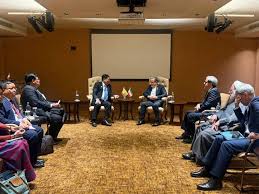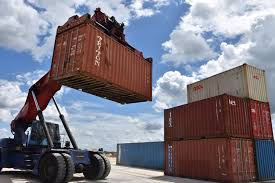Kampala, Oct. 15, 2025 (MNA) — Iranian Foreign Minister Abbas Araghchi and Myanmar’s Union Minister for Foreign Affairs, Than Swe, held talks in Kampala on Wednesday on the sidelines of the 19th Mid-Term Ministerial Conference of the Non-Aligned Movement (NAM), focusing on ways to deepen political and economic cooperation between Tehran and Naypyidaw.
The meeting took place shortly after Araghchi’s arrival in the Ugandan capital, where the NAM foreign ministers gathered to deliberate on key international challenges, the principles of multilateralism, and efforts to strengthen South–South cooperation.
During their talks, the two ministers emphasized the need to expand bilateral cooperation, particularly in areas of trade, agriculture, energy, and education, as both countries seek to diversify partnerships amid growing geopolitical realignments.
Foreign Minister Araghchi reaffirmed Iran’s readiness to share its technological and industrial experience with Myanmar, especially in fields such as agriculture mechanization, oil and gas, health, and renewable energy.
“Iran believes that developing countries must strengthen their cooperation to achieve independent and sustainable growth. Tehran stands ready to cooperate with Myanmar in sectors that contribute directly to people’s welfare,” Araghchi said.
Minister Than Swe, for his part, welcomed Iran’s proposal and expressed appreciation for Tehran’s consistent support of non-interference and respect for national sovereignty, noting that both countries face similar external pressures.
“Myanmar values Iran’s independent foreign policy and its commitment to the principles of the Non-Aligned Movement,” Than Swe said. “We look forward to advancing cooperation that benefits both nations.”
Both sides underscored the importance of preserving the core values of the Non-Aligned Movement, particularly respect for sovereignty, multilateral diplomacy, and resistance to unilateral sanctions.
The ministers exchanged views on global issues, including the ongoing humanitarian crises in Gaza and Myanmar, and the need for the international community to pursue dialogue-based solutions rather than coercive measures.
Araghchi stressed that the unilateral actions and double standards of some Western powers threaten international peace and stability, urging greater solidarity among NAM member states to uphold the UN Charter and international law.
“The Non-Aligned Movement must remain a voice for justice and equality in the global system,” he said. “We must collectively reject any attempts to reimpose domination or selective enforcement of international rules.”
The two diplomats agreed to revitalize the Iran–Myanmar Joint Commission — dormant since before the COVID-19 pandemic — and instructed their respective foreign ministries to prepare a roadmap for cooperation.
They also discussed the possibility of exchange visits between trade and academic delegations later this year to explore new partnership opportunities.
According to diplomatic sources, the meeting marked the highest-level contact between Tehran and Naypyidaw in several years, signaling a gradual normalization of engagement following Myanmar’s recent participation in several Asian regional forums.
Foreign Minister Araghchi’s visit to Uganda comes as Iran continues to strengthen its diplomatic footprint across the Global South. In recent months, Tehran has pursued closer ties with African and Asian nations, emphasizing shared opposition to Western sanctions and economic isolation.
The Kampala meeting — chaired by Uganda’s Foreign Minister Jeje Odongo — brings together delegations from over 100 countries to discuss collective responses to global inequities, including food security, climate change, and the reform of international institutions.
Iran, a founding member of NAM, has long advocated for enhanced South–South cooperation and the creation of mechanisms to resist economic coercion and unilateralism.
The Iran–Myanmar meeting reflects a broader diplomatic effort by Tehran to consolidate alliances among Asian and African partners that share concerns about external interference and seek greater autonomy in global affairs.
Both sides agreed to maintain dialogue and explore specific areas of technical and educational cooperation ahead of the next NAM summit scheduled for early 2026.



